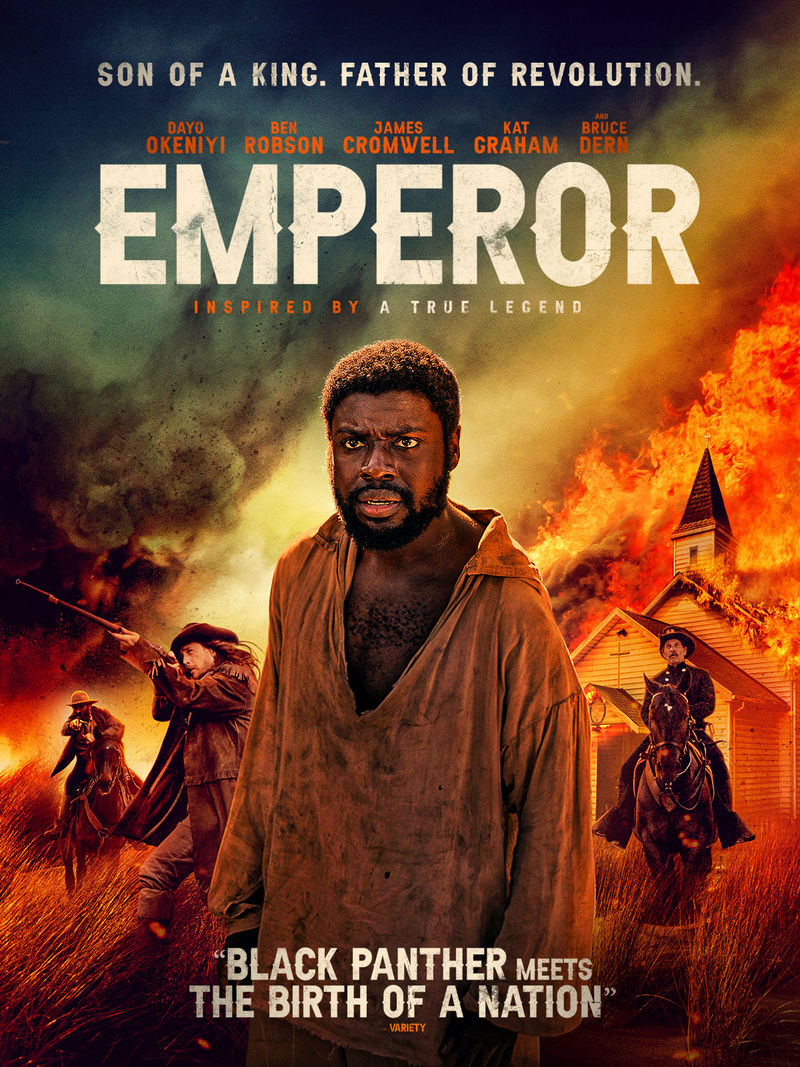
Review by
Benjamin Poole
Directed by: Mark Amin
Starring: Dayo Okeniyi, James Cromwell, Ben Robson, Kat Graham, Bruce Dern, Mykelti Williamson, James Le Gros,
Paul Scheer, MC Gainey

Looking back at cultural events over the last few years, one can't help but think that a reminder of where institutional
disparity between white and black in the USA originated, and the
antecedents of cultural entitlement and reciprocal mistrust began, may be
timely. And also, while we're at it, if such an aide-memoire were to
exist, wouldn't it be especially potent if it was contextualised within
the myth making of genre filmmaking, and perhaps not the perceived
worthiness of Oscar bait? It seems that films like
12 Years a Slave, as important as they are, never have the efficacy of populist cinema,
which exists more enduringly within the prevalent culture.

Enter Mark Amin's Emperor (with co-writer credit to
Pat Charles, and also produced by Reginald Hudlin, who I
will always have a soft spot for, not least of all for his dynamic run on
Marvel's Black Panther comic in the mid 2000s), a fast and loose biopic of
escaped slave and folk hero Shields Green, which depicts the Jim Crow
South Carolina of the 1850s through a kinetic, action lens.
This isn't a history lesson, and nor should it be: an opening intertitle
advises that the film is "Based on a True Legend," and the ensuing
narrative shapes what could have happened into a tale which is both
archetypal and inspirational. This is what storytelling is after all; this
is what cinema does. As a voiceover (via a character who doesn't even
exist "in real life": Green's book writing son) forcefully intones, "The
history of the Civil War was written by white men to serve their own
agenda; it's time for a black man to tell his own story."

And what a story it is, and so excitingly told! We follow Shields Green
cross-country as he escapes from the plantation and embarks on a journey
which ultimately sees him fight at the abolitionist raid at Harper's Ferry
(Green's presence at the battle is historically accurate, at least). While
the film does duly depict the sort of atrocities which occurred on
plantations - both Green and his little son are whipped, triggering his
escape - Emperor is at heart a gleeful, boys own adventure.
At one point we see Green and a pal evade capture by utilising a hollowed
out log which they repurpose as camouflage to meander down river. There is
also a wagon race involving sharp shooting, explosions and broken axles
which is honestly one of the most thrilling scenes you will see all year -
a joy.
Intriguingly, the white people in Emperor are either part of
a filthy rich establishment greedily clinging to their privilege, or dirt
poor rednecks hoping for a few scraps from the table: a binary depiction
which, subtly, implies that, as ever, class hierarchy is the real evil
which corrupts Western society. There is an exception though, both in
terms of white representation and as a bum note within the film's general
tone, by way of Ben Robson's bounty hunter who is hired to track
down Green; a vocation which unwritten action cinema rules state must be
portrayed as cool, no matter what. It sort of doesn't work here, as this
shitbag essentially shoots unarmed and destitute escapees. Big man, but
also an interestingly repellent characterisation which (perhaps
inadvertently) speaks to the sort of romantic, outlaw image which the
American right cling to when they do things like raid the Capitol. It
feels good when he gets his, and, by extension, Emperor's utopian stylings have their own instructive positivity, too.

Perhaps in real life these stories do not have happy endings (the actual
Green was hung a few days after Harper's Ferry, and, if he did have a son,
probably didn't meet him and accordingly relay his derring-dos), but this
celebration of emancipation, and cinema's essential escapism, provides
ambition and aspiration beyond the dominant hegemony.

Emperor is on Prime Video UK now.
